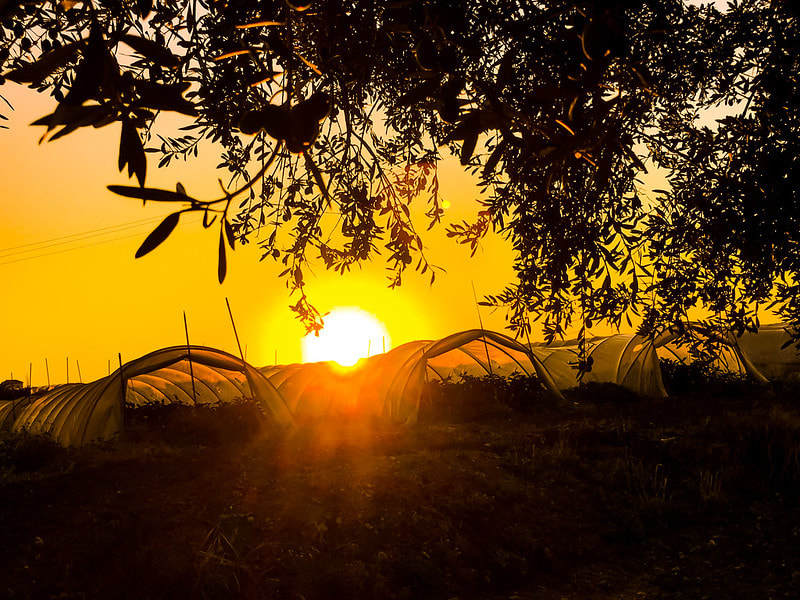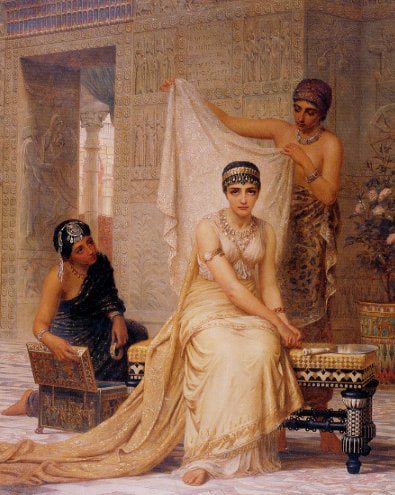|
When a new year is about to take place, do you look to the past to see what has happened and then to the future to determine what you could accomplish? I think the practice of setting informed goals helps us in being able to chart the course for our lives. Perhaps this is what God was thinking when He established a yearly cycle for His people beginning with Nisan. This first month was planned for the deliverance of the children of Israel from slavery to the Egyptians and victory in taking the Promised Land where freedom would be theirs.
Presently, we are at the beginning of the month of Nisan. If we look at the book of Exodus during this time period, we see how God was showing the Israelites His power by sending plagues and natural disasters upon Pharaoh and the Egyptians. We can relate to some of those plagues. East Africa and South Asia are battling billions of locusts that are destroying their crops and livelihoods. And, of course, thousands have died around the world from Coronavirus. The disease is taking its toll on our physical bodies, our economies and our way of living life. When God was about to send the plague of the death of the firstborn throughout Egypt, He told His people to begin a new cycle of life. Nisan was to be the first month of the year for them. He told Moses the following: "Tell the whole community of Israel that on the 10th day of this month each man is to take a lamb for his family, one for each household...The animals you choose must be year-old males without defect, and you may take them from the sheep or the goats. Take care of them until the 14th day of the month, when all the community of Israel must slaughter them at twilight. Then they are to take some of the blood and put it on the sides and tops of the door frames of the houses where they eat the lambs… This is how you are to eat it: with your cloak tucked into your belt, your sandals on your feet and your staff in your hand. Eat it in haste; it is the Lord's Passover." (Exodus 12:3, 5-7, 11) After the Isralites selected their lamb, slaughtered it on the 14th of Nisan and spread the blood on the door frames, they were to stay in their homes until morning. They would be protected by the blood of the lamb. The destroyer would pass over the doorways covered by the blood; the Lord would protect them. After 430 years of bondage in Egypt, the children of Israel were set free to begin their journey to the Promised Land. A Passover meal has been celebrated ever since this first one. Jesus celebrated it with His disciples before His crucifixion. Today Christians call this meal communion. I would like to suggest that the quarantine that we are now experiencing may have the unexpected outcome of bringing us freedom from the bondages of our age. God's people are meant to be different from the rest of the world. This time alone is a time of rest where we can repent of our worldly lives, remember the Lord's deeds for all humankind, and look to Him, our Redeemer, to lead us on paths of righteousness and to a life filled with purpose. When we accepted Jesus as our Lord, the blood of the Passover Lamb (Jesus) was placed over our hearts. And Jesus demonstrated and admonished us to practice taking the meal called communion so that we remember Him. My husband and I have come to understand how important our daily practice of taking communion is to our relationship with the Lord and for our protection and healing. Daily we remember the Lord's benefits by declaring the beginning of Psalm 103. "Praise the Lord, my soul, and forget not all His benefits—who forgives all your sins and heals all your diseases, who redeems your life from the pit and crowns you with love and compassion, who satisfies your desires with good things so that your youth is renewed like the eagle's." Then we remember that Jesus is our Passover Lamb and that "He was pierced for our transgressions, He was crushed for our iniquities; the punishment that brought us peace was on Him, and by His wounds we are healed." (Isaiah 53:5) The Lord wants to set us free from the bondage of this world and lead us into our promised lands. Let's use this time of seclusion to draw closer to Him and watch as He leads us triumphantly out of bondage and into a life of victory and Kingdom authority. In the first chapter of Job we have a description of the kind of man that he was and of the tragedy that beset him. "...This man was blameless and upright; he feared God and shunned evil. He had seven sons and three daughters, and he owned 7,000 sheep, 3,000 camels, 500 yoke of oxen and 500 donkeys. He was the greatest man among all the people of the East." (Job 1:1-3) Job was dear to God because of his heart for Him. However, the Lord allowed the hedge that was around Job to be removed to prove to Satan that he would remain faithful.
Initially, all of Job's livestock and servants were taken from him by the Sabeans, the Chaldeans and a fire. Then all his children were killed by a "mighty wind." Job's response indicated the depth of his honor and love for the Lord. "At this, Job got up and tore his robe and shaved his head. Then he fell to the ground in worship and said: 'Naked I came from my mother's womb, and naked I will depart. The Lord gave and the Lord has taken away; may the name of the Lord be praised.'" (Job 1:20-21) This Scripture came to mind on Thursday as I processed what is happening in our world and in my own family and circle of close friends. Most of us are following our presidential guidelines for the war on Coronavirus by quarantining ourselves for two weeks. In the United States alone, as of today there are over 30,000 people who have contracted the virus and 400 who have died from it. Communication with family and friends is being done primarily by telephone or social media platforms. Fear and panic has struck many as we can see by empty shelves at the grocery store. Our financial means of support is being stretched. Travel by any means of public transportation has come to a halt. We do not know what the future holds. And yet, amid all of this, life and death go on. I was contemplating the fragility of life and remembering that we have no guarantees for tomorrow as I received notice that the husband of a dear friend died in his home of an unexpected heart attack. My friend is left shocked and devastated and unable to have a memorial service with friends to comfort her because of the virus that is spreading around the world. The same day that my friend died, we received news of the birth of a great grandson. Samuel Dillon was brought into this world and speaks to us of new life and encouragement. Even the meaning of his name brings joy. Samuel means "heard of God." It reminds me that God hears our cries for help in our time of need. Scripture confirms this. Look at 2 Chronicles 7:14 to see God's prescription for help when the times are dark. "If my people, who are called by my name, will humble themselves and pray and seek my face and turn from their wicked ways, then will I hear from heaven and will forgive their sins and will heal their land." Especially during seasons like these, we must remember that every day is a gift from God. We cannot count on tomorrow, so we must make the most of today. Job said this very thing: "Man's days are determined; you have decreed the number of his months and have set limits he cannot exceed." (Job 14:5) Psalm 90 is described as a prayer of Moses. In Verse 12 he asks God, "Teach us to number our days, that we may gain a heart of wisdom." King David repeats this in Psalm 39. "Show me, Lord, my life's end and the number of my days...Everyone is but a breath, even those who seem secure." (Verses 4-5) As Christians we need to focus on the eternal and live our lives to bless the Lord. While we are on earth, we have only one opportunity to live for the purpose for which we were made. Let us take every day as a gift from God to love and serve Him and to do the same for those around us. Don't miss an opportunity to say, "I LOVE YOU!" to your family and friends. Extensive thought has been given to what I am about to write. I have been challenged by a particular Scripture. After much study, I have more questions than I do answers. But I decided to post my dilemma in the hopes that one or more of you may have some revelation. "...In a multitude of counselors there is safety." (Proverbs 24:6 - KJ)
How often have you read or heard 2 Chronicles 7:14? "If my people, who are called by my name, will humble themselves and pray and seek my face and turn from their wicked ways, then I will hear from heaven, and I will forgive their sin and will heal their land." Frequently, I am sure. Yet have you looked at the context of this verse? Solomon had just successfully finished building the Lord's temple. He asked that the Lord come to His resting place at the temple. The Lord appeared to him and said, "I have heard your prayer and chosen this place for myself as a temple for sacrifices. When I shut up the heavens so that there is no rain, or command locusts to devour the land or send a plague among my people..." (2 Chronicles 7:12-13 - NIV) The King James version says, "If I shut up heaven," and NLT says, "At times I might shut up heaven." Knowing what is going on in our world today (droughts, locusts and plagues) I began to wonder if these things were sent by the Lord. The crucifixion of Jesus on the Cross was a gift from God to cover our sins. I know God as compassionate, loving, merciful and altogether wonderful. Would He send such a destruction and death to the earth? I also know Him as completely pure and holy, worthy of worship. He is a jealous God, wanting our affections and honor. How do we reconcile these characteristics? We are battling a pandemic in the world called Coronavirus or COVID-19. It is overwhelming the medical community, affecting the economy and changing our lives. Though medical scientists are rushing to find a vaccine to stop the virus it maybe too little too late. I read about a church in France where 15 people came to know the Lord because of their fear of death. Could this virus come from Him in order to bring many to salvation? Is this what we need to humble ourselves and call out to God for mercy? In the midst of all the chaos, I wonder: Does God still send plagues? Other Old Testament Scriptures sound somewhat like 2 Chronicles 7:13 including 2 Chronicles 6:26-31, Deuteronomy 11:17-18, Ezekiel 14:19-21, Amos 4:7. Wise King Solomon wrote, "Righteousness exalts a nation, but sin is a disgrace to any people." (Proverbs 14:34) The United States is a nation in sin. Chuck Smith calls it a national sickness caused by forgetfulness, neglect and rejection. We are guilty of idolatry, sexual immorality, killing the unborn and neglecting the Lord’s Day. Are we being disciplined by God? Has He reached the end of His patience with us? Is He using instruments of judgment talked about in Jeremiah 14:12 (sword, famine and plague) to redirect our course? If we look back in the history of our nation we find that in the summer of 1623 there was a severe drought in Plymouth, MA--so severe that the native Indians had never seen anything like it. The settlers called for an assembly of all of the people. They humbled themselves together before the Lord with fasting and prayer according to Edward Winslow's book The Light and the Glory. For one day they stopped all work and gathered to acknowledge God and repent of their sins. Before the day was over the rain clouds blew in and it began to rain. The rains lasted for 14 days. Sometimes we need to look back in history to chart our course for the future. Past presidents, including George Washington in 1789, John Adams in 1799, and Abraham Lincoln in 1863, called for national days of fasting and prayer to ask for repentance for past transgressions and mercy from God. Here is my conclusion. It does not matter where Coronavirus came from. It does matter how we respond! The future of our nation is at stake. Thankfully, our president has seen the need to call our nation to prayer. He said, "It is my great honor to declare Sunday, March 15, as a National Day of Prayer. We are a Country that, throughout our history, has looked to God for protection and strength in times like these...No matter where you may be, I encourage you to turn towards prayer in an act of faith. Together, we will easily PREVAIL!" The Church must lead the way in this call to prayer. Let us get on our knees and call out to God for mercy and revival. May I also suggest that you read Psalm 91 aloud every day. Humility is the key that opens the door to favor. This is so vibrantly demonstrated in the story of Queen Esther. Her entire life was laid down to honor God. As an orphan she was raised by her cousin Mordecai. Together, they were carried into exile from Jerusalem to the citadel of Susa, located in the Persian empire. Today this territory is in southwestern Iran. Esther's true Hebrew name was Hadassah, meaning myrtle. This low-growing tree can be found in high places. Like the meaning of her true name, Hadassah was moved from her lowly surroundings to the high place of the king's palace where she was groomed, along with other beautiful women from the kingdom, as a possible queen for King Xerxes. She took on the Persian name of Esther (meaning star) to conceal her Jewish identity.
Hadassah submitted herself to Hegai, the head of the king's harem. For one year she was refined with beauty treatments of perfumes, cosmetics and the oil of myrrh (an oil used to prepare bodies and representing purification and dying to self). At the completion of her time with the harem, Hadassah would be taken to the king's palace to spend one night with him. Afterward she would take up residence with the king's concubines and would not see him again unless summoned by name. Can you imagine how Hadassah must have felt with all that she faced? And yet, she was cooperative and loving so that she won the favor of those who cared for her. Hadassah was a perfect picture of her Hebrew name and blossomed while preparing for one night with the King. It is interesting to note that the flowers on the myrtle tree are white (representing purity) with purple borders (representing royalty) and are extremely fragrant. This humble woman of God was crushed to produce a sweet fragrance. She was destined to win the king's favor and became Queen Esther, the star! She rose to a high place in the kingdom of King Xerxes through her beautiful humility. In the outskirts of the palace, at the king's gate, Esther's loyal caregiver, Mordecai, kept vigil. She was in regular contact with Mordecai and continued to follow his instructions. During her tenure as queen, King Xerxes appointed a man named Haman to a position higher than all the other nobles in the kingdom. He was an Agagite, a descendant of Agag who was an enemy of Saul and the nation of Israel. Isn't it fascinating that Mordecai was from the tribe of Benjamin like Saul? The ancient battle between the Jews and Agagites was renewed. Mordecai refused to kneel down to Haman. In a fit of anger, Haman decided to kill Mordecai and all the Jews in the kingdom on a set date. They "cast the pur" (lot) to select the 12th month (Adar) and the 13th day on the Hebrew calendar, and a decree explaining this edict was sent to all the provinces. Can you see how God positioned Esther for "such a time as this?" She proved her faithfulness to Him. Once again, she would need to take up a position of humility and die to self in order to save her people. She was asked to petition the king and plead for mercy for the Jews. Esther would be risking her very life by revealing her heritage as a Jew and by approaching the king without being summoned. She agreed to approach the king in the inner court and gave Mordecai the following instructions: "Go, gather together all the Jews who are in Susa, and fast for me. Do not eat or drink for three days, night or day. I and my maids will fast as you do. When this is done, I will go to the king, even though it is against the law. And if I perish, I perish." (Esther 4:16) Esther prepared for her assignment by humbling herself before God. She needed His favor more than anything else. I wonder if she knew that her Persian name was a prophetic sign for her life. This wise and brave woman would "shine like the brightness of the heavens" (Daniel 12:3) as she laid down her life to become a light in the darkness to save the Jews. The day set aside to annihilate the Jews became a day of celebration called Purim. King Xerxes extended his gold scepter to Esther. Haman's evil plot was exposed, and he was put to death. The days meant for slaughter became days of victory for the Jews. A decree was written: "...And these days of Purim should never cease to be celebrated by the Jews, nor should the memory of them die out among their descendants." (Esther 9:28) We have much to learn from Hadassah/Esther. Humility brings the favor of the King of kings and leads us to a shining victory! In the final chapter of Isaiah, the Lord asks a key question: "Heaven is my throne, and the earth is my footstool. Where is the house you will build for me? Where will my resting place be?" (Isaiah 66:1-2) The glory of the Lord comes wherever He rests and brings with it revival.
When we look back to 1 Chronicles 21 and 22, we see that King David purchased the threshing floor of Araunah the Jebusite so that he could build an altar to the Lord and sacrifice burnt and fellowship offerings on it to stop the plague that was killing the people of Israel. As he sacrificed, "The Lord answered him with fire from heaven on the altar of burnt offering." (1 Chronicles 21:26) After this, David said, "The house of the Lord God is to be here, and also the altar of burnt offering for Israel." (2 Chronicles 22:1) David made extensive preparations for the construction of the temple because his son, Solomon, called a man of peace and rest, was the kind of person God wanted to build His house. All the officials of Israel were summoned to assemble at Jerusalem where David announced his plans. Solomon was commissioned to build the house of the Lord and to lead God's people in His ways. First Chronicles 28:12 tells us that David "gave him the plans of all that the Spirit had put in his mind." The temple was built on Mt. Moriah, where the Lord appeared to David. There was great rejoicing and a spirit of unity with the people of God as they gave and gathered all the supplies needed for building the temple. On the day when it was dedicated "fire came down from heaven and consumed the burnt offerings and the sacrifices, and the glory of the Lord filled the temple." (2 Chronicles 7:1-2) The temple made with hands was eventually destroyed. But God had a plan for a new type of temple. Paul explains it: "The God who made the world and everything in it is the Lord of heaven and earth and does not live in temples built by hands." (Acts 17:24) He told the Corinthians, "Don't you know that you yourselves are God's temple and that God's Spirit lives in you?" (1 Corinthians 3:16) In Chapter 6, Verses 19-20, he gives more details: "...You are not your own; you were bought at a price. Therefore, honor God with your body." The Spirit of the Living God took up residence in the spirits of His people. Wherever the Spirit dwells there is glory and potential for revival. For this to happen our souls must bow to our spirits so that the Holy Spirit has priority and we follow His leading. Around the world there are churches contending for revival and wondering what it will take for God to dwell in their presence. Sid Roth, in his book The Incomplete Church, asks some interesting questions: "What would the church be like today if we started from scratch and just followed the Scriptures? What would happen if we removed all tradition from Judaism and Christianity, and Jews and Christians came together as one? Let me introduce you to the Glorious Congregation--the emergence of the One New Man--Yeshua!" God is looking for a house where He can come and dwell. He is looking for a people who will dwell in unity. (Psalm 133) "For He Himself is our peace, who has made the two one and has destroyed the barrier, the dividing wall of hostility, by abolishing in His flesh the law with its commandments and regulations. His purpose was to create in Himself one new man out of two, thus making peace...In him the whole building is joined together and rises to become a holy temple in the Lord. And in Him you too are being built together to become a dwelling in which God lives by His Spirit." (Ephesians 2:14-15, 21-22) Sid Roth says, "His objective is to 'gather together in one all things in Messiah.' (Ephesians 1:10) When the wall between Jew and Gentile is removed, the spiritual temple, God's dwelling place, will be restored, and this One New Man will release resurrection power to the Church that Paul calls 'life from the dead.'" (Romans 11:15) As we worship together in unity, God's glory will return. How I hunger for such a day! Will you join me in prayer for God to knit us together as One New Man so that His glory can be released in our midst? |
Joan E. MathiasCategories
All
Archives
July 2024
|





 RSS Feed
RSS Feed